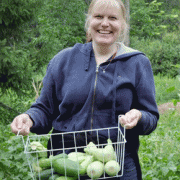 Jeremy writes: At LifeWays we encourage the development of strong bonds and relationships between the children who attend the center and their peers, caregivers, and parents. In addition to these relationships we strive to reinforce a relationship between the children and their food. Just as important as the relationships that strengthen the community the child resides in, the relationship with their food provides both physical nourishment and nourishment of the soul, as well as an appreciation for the bountiful harvests that the planet allows us to produce.
Jeremy writes: At LifeWays we encourage the development of strong bonds and relationships between the children who attend the center and their peers, caregivers, and parents. In addition to these relationships we strive to reinforce a relationship between the children and their food. Just as important as the relationships that strengthen the community the child resides in, the relationship with their food provides both physical nourishment and nourishment of the soul, as well as an appreciation for the bountiful harvests that the planet allows us to produce.
The kitchen at LifeWays is the central hub of the building, an area that all of the children must pass by on their way to the restroom or their suite. It is also the first place—in the center—that they turn to see as they descend the stairs. Our kitchen is not walled off in some obfuscated corner of the building, but rather wide open and centrally located, so the children can experience the creation of their meals. One of the most enjoyable parts of my day is when the children come in to help set the tables and all run up to ask me what it is that we are having for lunch that day. They care about their food and are curious about the smells that have been radiating from the building while they spend their morning outside experiencing their peers and their beautiful planet. It is important for the children to know and understand that there is no bush that produces bread or no tree that soup is extracted from. When the meal is prepared in full view of the children, they are able to see how much love and effort is put into the creation of their meals. I often hear my name called from a table during the lunchtime meal, followed by a sweet voice thanking me for the delicious food. When I hear those words, I know that I have done my part to nourish both the body and the soul.
Throughout the year there are several days dedicated to both planting and harvesting crops at Miss Mary’s farm in West Bend, WI. On those days parents and children are invited to come to Paradise Farm and get their hands into the soil and sow the seeds that they will then harvest when the time is right. Just recently there was a farm day in which the families travelled to the farm to harvest the potatoes they had planted earlier in the year. There were several varieties of potatoes, planted so the children were able to see that the “cookie-cutter” foods sold at most large supermarket chains are not the only forms of food available. They were able to harvest red, yellow, purple, and russet potatoes of all different shapes and sizes, some eaten by insects and others in near pristine form. These potatoes were then brought in to LifeWays and washed, chopped, and cooked into a delicious soup and, the next day, mixed with grains and lentils for another healthy meal. By harvesting these precious tubers from the ground the children were able to see the path that their food takes before they are able to gobble it up and, most importantly, where it comes from.
We make a conscious effort at LifeWays to make sure the children are informed when they are eating food from Miss Mary’s farm or from our small plot out in front of the center in the community garden. The children are able to visualize the farm with its barn and goats and bees and to connect to their food in a way that has been all but lost for many humans in our modern existence. This close relationship to their food is an integral facet of the child’s experience at LifeWays, an important part of the development of their physical body, and a basis for the nourishment of their soul.
Jeremy Bucher is afternoon caregiver and cook at LifeWays Early Childhood Center in Milwaukee. This article was originally published in the Center’s Fall, 2014 Newsletter.
